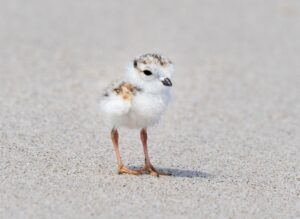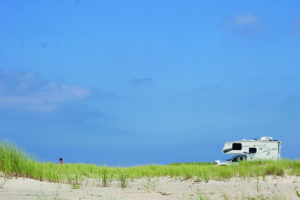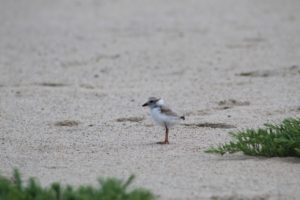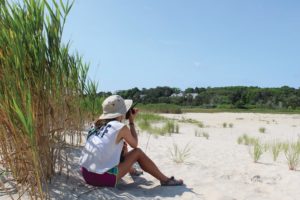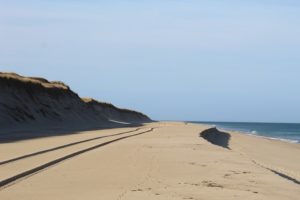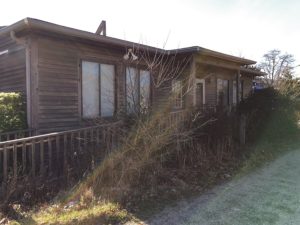PROVINCETOWN — Mildred Champlin remembers a time when piping plover chicks were in constant danger of being run over by cars on Race Point Beach. She has spent every summer since 1957 at the dune shack she calls Mission Bell, and she recalls guides from Art’s Dune Tours planting sticks in the sand to mark the birds’ tiny nests so that drivers wouldn’t accidentally squash them.
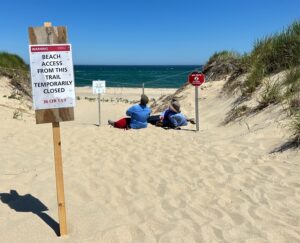
The federal Endangered Species Act has been the law since 1973, and rangers in the Cape Cod National Seashore are now in charge of marking plover nests as well as installing temporary posts and strings along the beach to warn hikers and drivers to keep their distance.
This season, the barriers have included one that blocks a popular hiking trail that runs from the intersection of Route 6 and Snail Road out to the ocean. At the beginning of the trail, a sign warns there is no beach access, and at the trail’s end there is a string fence and a group of signs.
“Beach access from this trail temporarily closed,” says one. “No vehicles, no dogs, no entry,” says another. “These rare birds, their nests and eggs are protected.”
The Atlantic coast population of piping plovers was listed as “threatened” under the Endangered Species Act in December 1985. (The Great Lakes population was listed as endangered that year, while the Great Plains population was also listed as threatened.)
A 1986 census found only 170 breeding pairs in Massachusetts. Last year’s census found 1,178 breeding pairs in the state, however, with half of them on Cape Cod. There were 64 breeding pairs in Provincetown and 41 in Truro, according to that count — almost 9 percent of the state’s total.
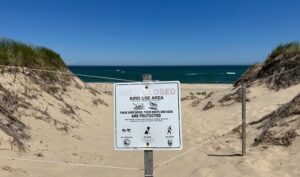
Geoffrey Sanders, chief of natural resource management and science at the Cape Cod National Seashore, said that the U.S. Fish and Wildlife Service sets guidelines for buffer areas around plover nests, and the Park Service is in charge of implementing them.
Disturbances from humans, cars, or dogs can cause plover parents to be flushed from their nests. They’ll do a “broken wing display,” Sanders said, to draw predators away from their eggs and chicks.
“When they’re flushing the nest, they’re no longer incubating or protecting eggs or chicks,” Sanders said. One reason that birds sit on their eggs is to keep them at a constant temperature; if the sun overheats unprotected eggs, it can harm them.
The Park Service, using “flexible management,” can reduce the buffer zone to allow more access on the six official National Seashore beaches: Race Point, Herring Cove, Head of the Meadow, Marconi, Nauset Light, and Coast Guard. “Instead of requiring a 50-meter buffer, we can reduce it to close to 10 meters” at those beaches, Sanders said.
The stretch of Race Point Beach where the hiking trail reaches the ocean is not one of the six designated beaches, however.
“The law requires a certain amount of buffer distance away from the nest, and if we can’t achieve that, we close those areas,” Sanders said.
Reaching the Beach
A Chatham resident who was selected by lottery for a weeklong stay at the Euphoria dune shack this June said that, because beach access was blocked near the shack, he walked about a mile and a half down the dune taxi trail to reach the ocean.
“I can’t even tell you where there’s another access point, because it’s pretty far from us,” said Marianne Benson, who has spent summers in the dune shack she calls “the Grail” with her husband, Peter Clemons, since 1974.
The National Seashore maintains a list of public closures on its website, but it does not tell dune shack dwellers or lottery winners where the nearest access points are to their shacks.
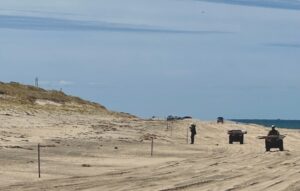
“We understand the necessity to protect wildlife,” said Laurie Schecter, who was first granted a lease for the Peg Watson dune shack in 1993. Nonetheless, losing beach access has a cultural cost, she said, since the shacks are places of solitude while the beach was a place for socializing.
The National Seashore’s shorebird crew tries to be conscious of the dune shacks, Sanders said.
“They recognize that people at the shacks are going to want to get on the beach,” he said. “That’s part of the beauty of being out there. They work really hard to find a way to create a spot for them.”
Benson said she regularly sees tourists wandering off-trail to find an open route to the beach, despite the sign at the beginning of the trail that warns hikers that beach access is “temporarily closed.”
Visitors follow footprints or walk the off-road vehicle route for an extra mile and a half, as the Euphoria shack’s recent visitor did.
On July 3, the Park Service issued a press release seeking information about multiple incidents of vandalism in which the phrase “Bird Nazis” was spray-painted on road signs and an off-road vehicle.
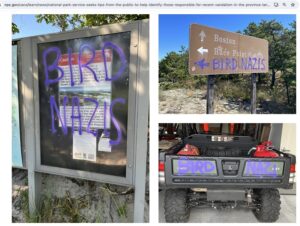
According to the press release, the incidents took place between June 15 and July 3 near Herring Cove Beach and the Wood End Marsh bicycle rack in Provincetown’s West End.
The episode was unusual for many reasons — including that anti-plover messages, once a common feature on bumper stickers on Cape Cod, largely disappeared more than a decade ago.
Despite their concerns about beach access, the residents and dune dwellers who spoke to the Independent largely affirmed the importance of plover conservation and the Park Service’s approach to the job.
“In general, their job is to care for nature,” said Schecter, “and if they feel like this is the best way to do it, I’ll support them.”
